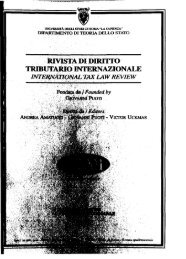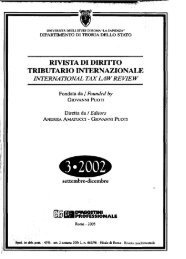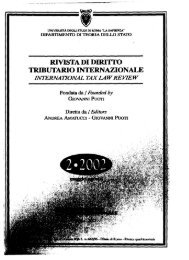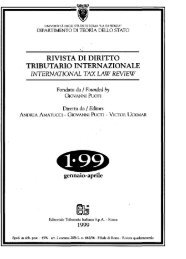RIVISTA DI DIRITTO TRIBUTARIO INTERNAZIONALE - Rdti.it
RIVISTA DI DIRITTO TRIBUTARIO INTERNAZIONALE - Rdti.it
RIVISTA DI DIRITTO TRIBUTARIO INTERNAZIONALE - Rdti.it
Create successful ePaper yourself
Turn your PDF publications into a flip-book with our unique Google optimized e-Paper software.
G. Petn"llo: Interpellation in the Statute of Taxpayers' Rights<br />
guarded by paragraph 6 of Artiele 11 in the Statute; this has given rise to<br />
some tricky problems regarding coordination between the area of operativ<strong>it</strong>y<br />
of "ordinary" interpellation regarding aspects of doubtful interpretation<br />
referred to concrete and personal cases, w<strong>it</strong>hout any objective lim<strong>it</strong>,<br />
and that of the interpellation foreseen by Art. 21 of Law No. 41311991<br />
which, even in the context of the matters to which <strong>it</strong> is applicable, entails<br />
the "juridical defin<strong>it</strong>ion of a fact" (32).<br />
The peculiari ti es of this latter type of interpellation may be summarised<br />
as follows: impossibil<strong>it</strong>y of considering the opinion bindingly effective<br />
and excessively complex requirements far silence ta consti tute<br />
consent (fru<strong>it</strong>less expiry of the deadline period of sixty days after the request<br />
for an opinion addressed to the Advisory Comm<strong>it</strong>tee and of a further<br />
sixty days after serving formai notice to comply). The course of the<br />
procedure is thus characterised by a whole series of Iim<strong>it</strong>ations that make<br />
<strong>it</strong>s concrete application far too complex (33), w<strong>it</strong>h the risk of giving rise<br />
in actual fact to s<strong>it</strong>uations more Iikely to produce I<strong>it</strong>igation than to reduce<br />
<strong>it</strong> (34). Hence we cannot avoid noting that <strong>it</strong> would have been<br />
preferable to proceed to cancel such "special interpellation" and provide<br />
for <strong>it</strong>s inclusion in the framework of the "statutory" discipline on "interpellation";<br />
as things stand, indeed, whoever must resort to the "old" pro-<br />
(32) In this sense, see La Rosa, Prime considerazioni sul din'tto di interpello, in "Il<br />
fisco", n. 32/2000, page 7950.<br />
(33) On this topic, see Zizzo, Dir<strong>it</strong>to d'interpello e ruling, in Riv. dir. trib., 1992, I,<br />
136, ss.; La Rosa, Prime considerazioni sul dir<strong>it</strong>to di interpello, Fisco, 7946; M. V. Serranò,<br />
Dir<strong>it</strong>to di interpello e garanzie del contribuente, in L. Ferlazzo Natoli- M. V Serranò-<br />
G. Ruta, Tutela extragiudiziale del contribuente nell'ordinamento tributario. Ruling<br />
e Verfassungsbeschwerde", Torino, 1998; Consolo, I pareri del Com<strong>it</strong>ato per l'applicazione<br />
della nonnativa antielusiva e la loro sfuggente efiìcacia, in Dir. prato trib., 1993,<br />
I, 95 l et seq., according to whom the Comm<strong>it</strong>tee plays the role of " hinge between the<br />
administrative and the jurisdictional functions"; Trimeloni, Atti interpretativi dell'amministrazione<br />
finanziaria, inserted in Corro trib. n. 2/94; Romano, Nuove disposizioni<br />
in materia di "ruling" (Belgio), in Dir. prat. trib., 1999, III, p. 588 ss; Leonardi, Interpello<br />
per la non disapplicazione delle nonne antielusive, in Boll. Trib., 2000, pag., 808.<br />
Fals<strong>it</strong>ta, Manuale di dir<strong>it</strong>to tributario, Milan, 1996, pago 80, who identifies, as is well<br />
known, as the m'o pseudo sources of tax law the interpretational circular and the interpeUation,<br />
w<strong>it</strong>h regard to the effectiveness of a "ruling" as in the case of agreement between<br />
the parties, recognises that "the ministerial reply or that of the comm<strong>it</strong>tee, if in<br />
keeping w<strong>it</strong>h the interpretational solution proposed by the requester, also cannot be ignored<br />
by e<strong>it</strong>her of the parties in the tax relationship but solely in the case decided thereby,<br />
thus finally overcoming the equivocaI concept of reversal of the burden of proof'.<br />
(34) On this topic, see Iacondini, Il rnling: come è oggi come dovrebbe essere domani,<br />
in Riv. imp. dir. 1992, p. 983.<br />
<strong>RIVISTA</strong> <strong>DI</strong> DlRIlTO TRIBCTARIO <strong>INTERNAZIONALE</strong> 312001






